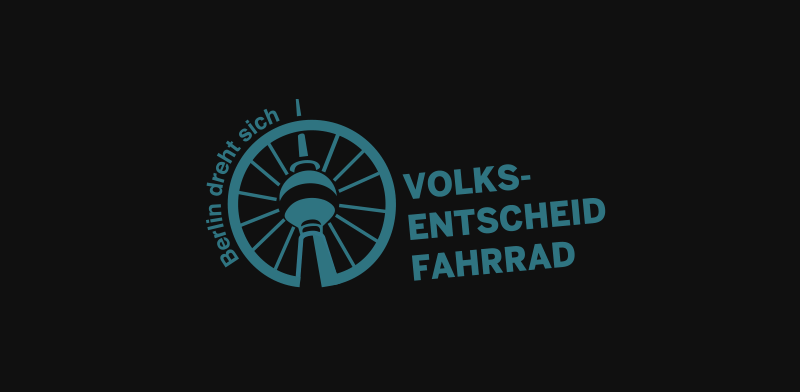Does Berlin need a cycling policy referendum?

Yesterday one of the initiators of the “Volksentscheid Fahrrad” in Berlin came to make a presentation at my local Grüne party meeting. The campaign initiators want to use Berlin’s direct democracy systems to put 10 major changes to Berlin cycle infrastructure into law – these include some pretty major infrastructure demands such as 200km extra cycle paths, each 5m wide, by 2020. As I have previously argued (see the case, and videos 1 and 2), Berlin cycle infrastructure is in need of improvement – so demanding things like this make sense.
My issue is with the means being used to make the demand.
The Berlin process is an interesting one – the process used here is a bottom-up system, not a means of politicians to dodge an issue (the main use of referendums in the UK). There are two stages the bicycle proposal will have to pass – firstly a Volksbegehren which I will call the citizens’ initiative*, that requires signatures to be gathered in two stages (first to get the thing approved into the process, and then far more to actually bring the proposal to the ballot box – about 490000 people in the latter stage). Once that is achieved, the Volksentscheid – the actual referendum (at ballot boxes in polling stations) can take place. 1/4 of those eligible to vote need to vote Yes for an initiative to pass – roughly 613000 people. This is the same procedure that was used to trigger a referendum to prevent anything being built on Tempelhofer Feld.
So is this the way to change cycling policy?
That then becomes a question of tactics. Opinions at the meeting varied on whether the campaigners were in it to actually gather the necessary signatures (and see the thing through to the end), or were more using this mechanism to apply pressure to other political actors. If the latter is indeed the case, why not then instead use a combination of campaign techniques with a petition being only one of those? The presenter yesterday was keen to stress the administrative and communications competence of the campaign, but a very basic WordPress site, and a rudimentary Twitter presence sure needs some attention!
It also surprised me to hear members of Berlin’s parliament, the Abgeordnetenhaus, who were present at the meeting talking of how the campaign was welcome to push the Berlin administration to act. However as members of parliament that is surely also their job? Would it not, I wonder, be a better use of cycling campaigners’ time to join and influence the policy programmes of the Grüne, SPD and Linke and, by that route, gather a majority of parliamentarians in the Abgeordnetenhaus in favour of radical cycling policies? It strikes me as a peculiarly post-democratic procedure when it is better for a political party to associate itself with a citizens’ initiative, and to then have its members of parliament be told what to do, rather than use its own members’ legislative power up front. Yes, I see administration in Berlin can be awful (as I argue here), but I still remain to be convinced that a referendum is the way to fix this issue.
It also worries me how precise the demands are from the cycling campaigners – I do not know if 200km of 5m wide cycle path is too much or too little. Is 400km of 3m wide path better? How is the demand for that, versus the need for cycle parking or cycle share schemes, supposed to be balanced out? And indeed how are these needs supposed to be balanced out against all the other complicated and expensive things the city is tasked with doing?
So demand better cycling policies, sure. But is a referendum on this the best way? I am far from convinced. A starting point might be to put a page on the campaign website explaining why this is indeed the best way to make change happen!
* Note that the vocabulary here is complicated – the distinctions between Volksbegehren, Volksentscheid and Volksabstimmung in German are hard to translate into English, not least because there are also regional difference in the use of the words in German! I hence am translating Volksbegehren as citizens’ initiative, Volksentscheid as referendum, and would translate Volksabstimmung as plebiscite (in that it deals with constitutional matters in Berlin). The rules of each – in German – are explained here and here on the Berlin Senate’s site. I’m grateful to Alexander Drechsel, Vincent Pluijmers, Mike Knell and Gabriel Siles-Brügge for their assistance on this on Twitter!